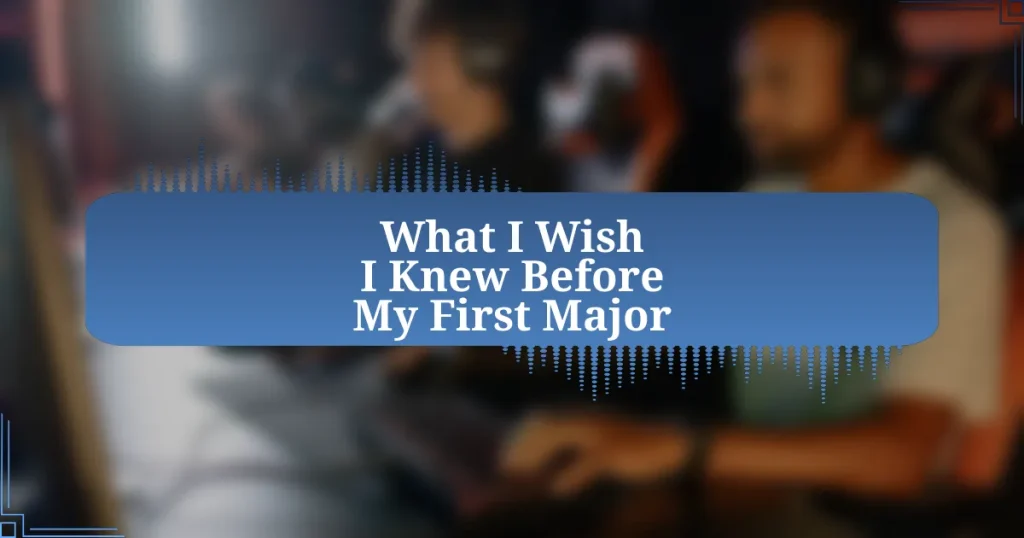Key takeaways:
- Understanding fundamental mechanics like spray control and crosshair placement significantly enhances gameplay effectiveness.
- Effective communication within a team is crucial for strategy execution and improving overall team performance.
- Learning from skilled players can provide valuable insights and foster personal growth in gameplay skills.
- Embracing failures as learning opportunities can lead to resilience and improved decision-making in matches.

Understanding Counter Strike 2 Basics
Getting into Counter Strike 2 can feel a bit overwhelming at first, especially when you see the level of skill some players showcase. I remember my initial matches were filled with confusion—what are these names like “spray control” and “crosshair placement” that everyone keeps talking about? Understanding these basics is essential; they form the foundation of your gameplay and can significantly impact your performance.
Let’s talk about the importance of maps. Each map in Counter Strike 2 has its own unique layout and strategies that can determine the outcome of a match. I vividly recall the first time I played on Dust II; it was a mix of excitement and anxiety as I tried to navigate its nooks and crannies. Getting familiar with the maps is not just about knowing where to go; it’s about anticipating enemy movements and positioning yourself strategically.
Lastly, let’s discuss the economy system, which might seem trivial but is crucial for long-term success in the game. I’ve learned the hard way that making smart financial decisions in-game can turn the tide in your favor. Why is it so important to save or spend wisely? Because a well-timed buy can give your team the edge it needs to dominate the match.
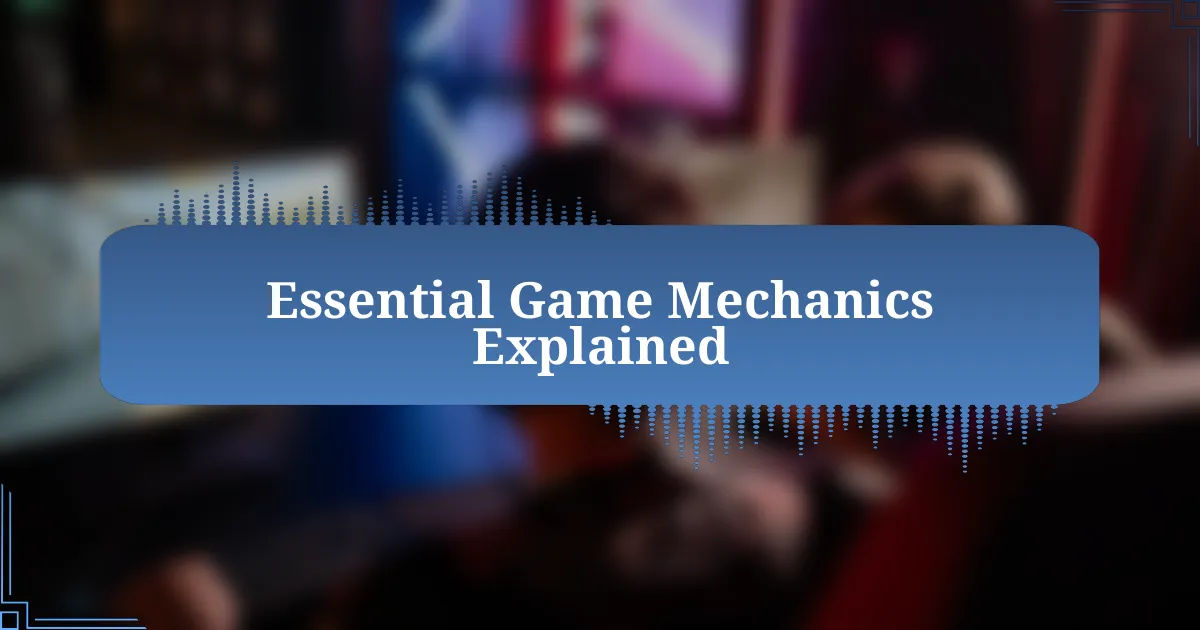
Essential Game Mechanics Explained
Understanding the mechanics of spray control is vital for any aspiring player. In my early days, I often found myself in frantic duels, wondering why my bullets went anywhere but my target. It took time to grasp that the recoil pattern of each weapon is predictable; once I learned to adjust my aim accordingly, I could see my accuracy improve significantly. Have you ever experienced that frustration? You’re not alone; many players go through that phase before mastering it.
Crosshair placement also plays an essential role in gameplay. I remember the moment I started keeping my crosshair at head level while moving around the map—it felt like a game-changer. It allowed me to pre-aim at potential enemy positions, making engagements smoother and more efficient. Were you aware that this simple adjustment can save you precious milliseconds in a firefight? It’s one of the easiest ways to elevate your game without needing extensive practice.
Don’t underestimate the importance of movement mechanics while playing. Initially, I was oblivious to how strafing and crouching could create an unpredictable target. By practicing these techniques, I found my survivability in matches improved greatly. It struck me: why was I so static before? When you learn to move fluidly, not only do you dodge bullets, but you also confuse your opponents, shifting the odds in your favor.
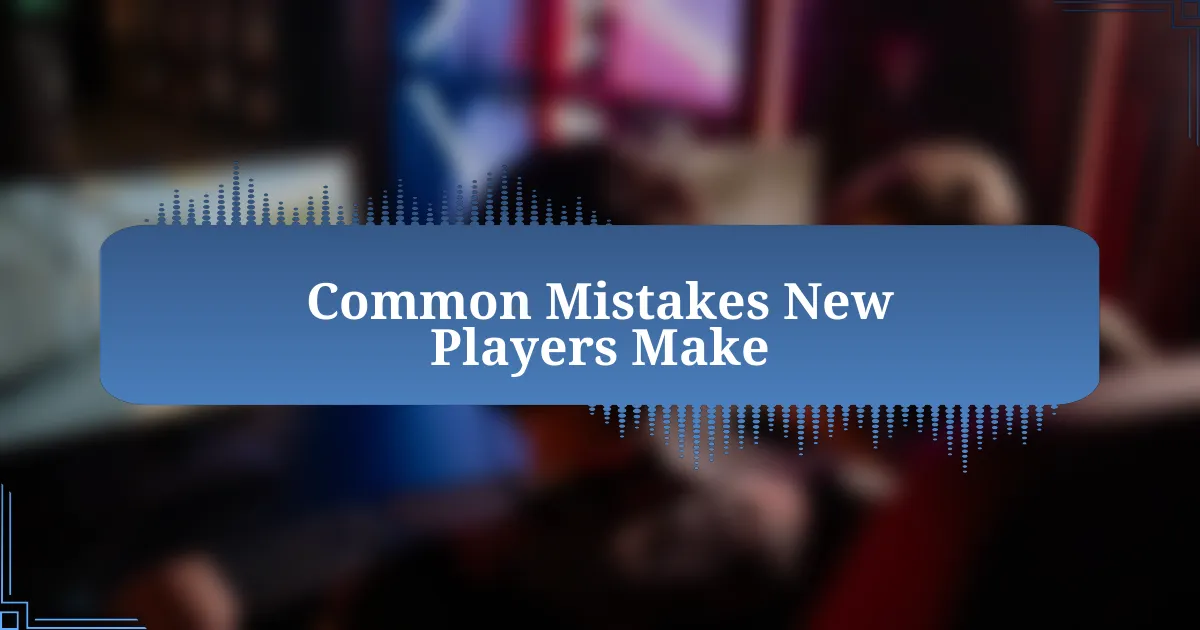
Common Mistakes New Players Make
One common mistake I often see new players make is neglecting to communicate with their team. In my early matches, I found myself playing solo, unaware that sharing information about enemy positions or strategies could significantly impact the game. Have you ever noticed how a few words over voice chat can lead to a well-coordinated attack? Trust me, effective communication can turn a struggling team into a well-oiled machine.
Another pitfall is underestimating the importance of economy management. When I first started, I was so eager to buy the latest gear that I often found myself running out of money halfway through a match. Can you relate to that frustrating moment when your team is struggling because someone can’t afford weapons? Learning when to save and when to spend is a crucial skill that I wish I had prioritized sooner; it can truly dictate the pace of the entire game.
Finally, many new players think they can master everything immediately, which leads to burnout. I remember feeling overwhelmed trying to perfect my aim while also learning the maps and strategies. Instead of pushing myself too hard, I wish I had taken a step back to focus on one skill at a time. Have you ever felt like you were in over your head? Taking a gradual approach not only enhances learning but also keeps the game enjoyable.
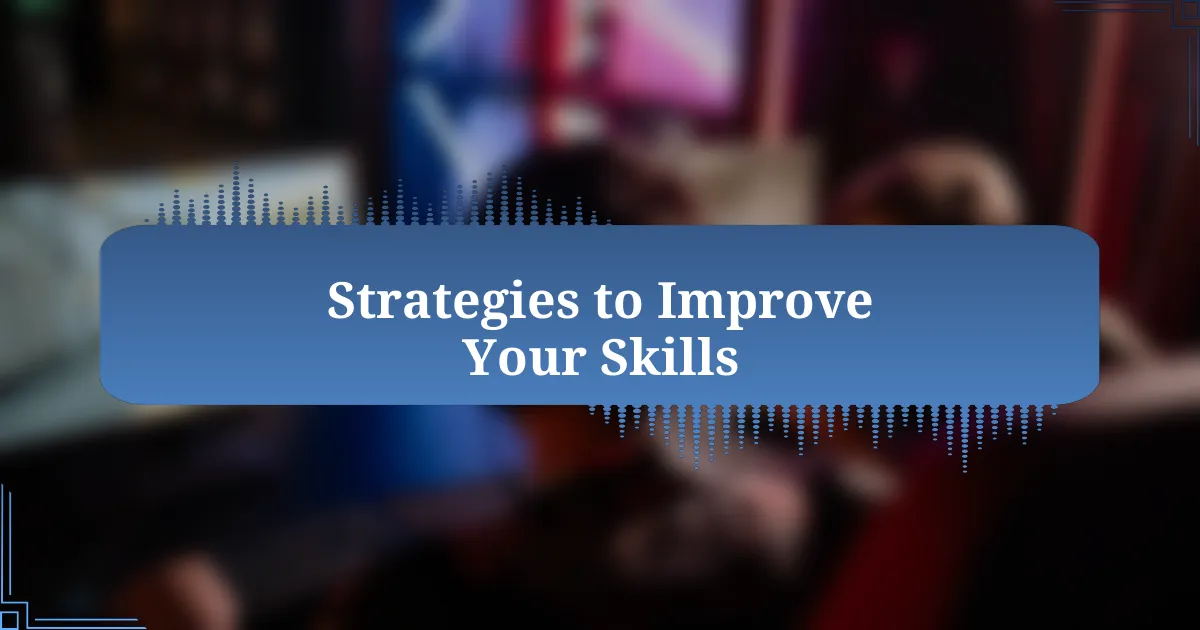
Strategies to Improve Your Skills
When it comes to improving your skills in Counter-Strike 2, practice is key. I spent countless hours in aim training maps, and I can tell you firsthand that focusing on your shooting mechanics can lead to noticeable gains. Have you ever tried using specific drills, like tracking or flicking, to sharpen your aim? I used to think raw skill was all that mattered, but incorporating structured practice made my shots more consistent.
Another valuable strategy is reviewing your gameplay. I found that watching replays of my matches was enlightening; it revealed mistakes I was unaware of in the heat of battle. Have you taken the time to analyze your own playstyle? Identifying patterns in your decision-making can help you adjust your tactics and avoid repeating errors.
Finally, I can’t stress enough the importance of playing with better players. Early on, I hesitated to join matches with more experienced teammates, fearing I would drag them down. Looking back, those games were pivotal for my growth. The insights and techniques I absorbed from skilled players not only improved my gameplay but also motivated me to push my limits. Have you thought about how learning alongside stronger opponents can elevate your own play? Embracing that opportunity might just unlock your full potential.
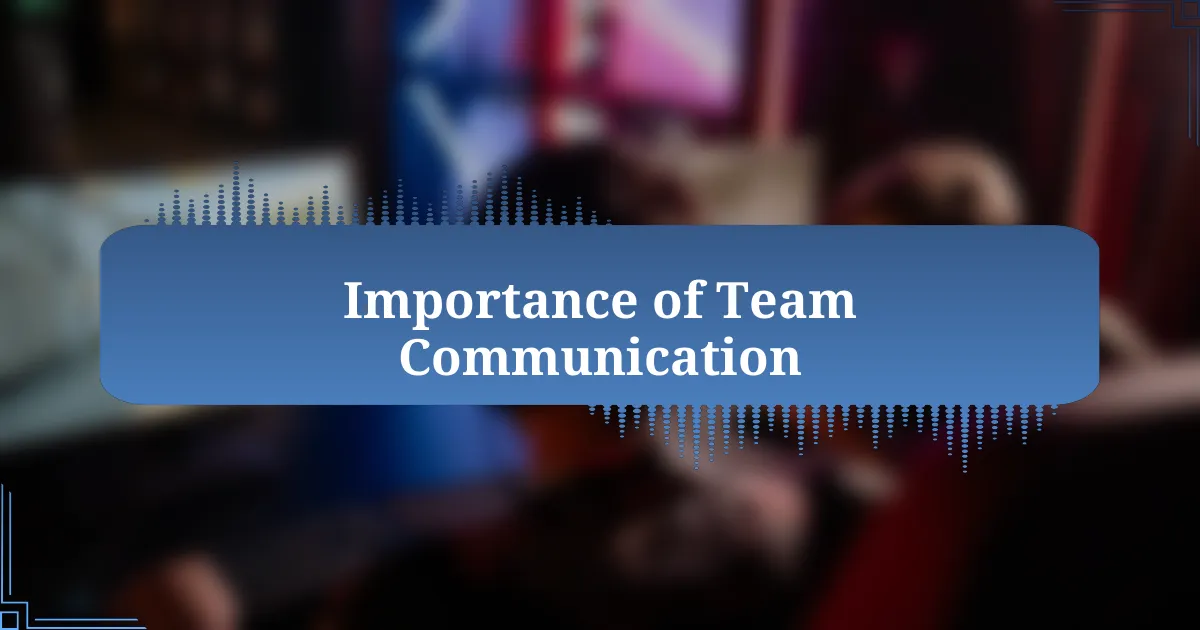
Importance of Team Communication
Effective communication within your team is crucial in Counter-Strike 2. I remember a match where we were struggling because we weren’t relaying information about enemy positions. Suddenly, one player started calling out every movement, and it completely transformed the game. It made me realize how even small details shared in real-time can shape the flow of a match. Have you ever noticed how clear communication can boost your team’s morale and confidence?
Additionally, I’ve found that establishing a common language with your teammates can create a sense of unity. For instance, we developed shorthand terms during a tournament that made conveying strategies swift and intuitive. In those high-pressure moments, I felt the strength of our connection; it wasn’t just about sharing tactics, but also about building trust. Could that shared vocabulary be what helps you feel more embedded in your team?
Lastly, I can’t underscore enough how communication can turn the tide of a game. I recall a moment where we were on the verge of losing, yet we took a pause to re-strategize together. As we discussed our options openly, I felt a renewed sense of purpose. Have you experienced the magic that teamwork brings when every player contributes their voice? If you haven’t, trust me; it can lead to not just victories, but unforgettable moments in your gaming journey.
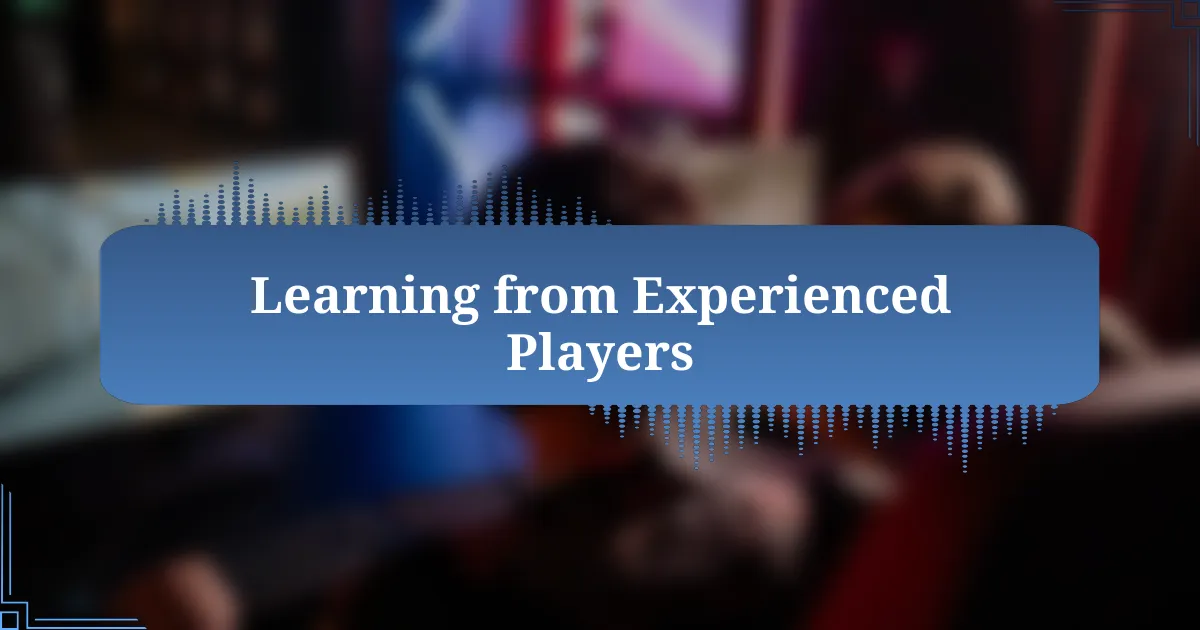
Learning from Experienced Players
Learning from experienced players can significantly influence your development in Counter-Strike 2. I remember when I first joined a clan with seasoned veterans. Their nuanced understanding of maps, weapon mechanics, and game strategies was eye-opening for me. Have you ever been in a scenario where you felt completely lost, only to realize that a more experienced player saw the bigger picture?
During one of our practice sessions, I watched as an experienced teammate dissected our gameplay, pointing out small mistakes that I had been blind to. The way they approached each round was analytical and strategic, making me rethink my own decisions. This level of insight made me appreciate the importance of learning from those who had faced similar challenges before. How often do you seek feedback on your gameplay?
There was also a pivotal moment when I was encouraged to ask questions and share my thoughts during team discussions. The respect my experienced teammates showed for my opinions, despite my inexperience, fostered an environment of mutual growth. It was empowering to realize that learning is a two-way street, and it highlighted the importance of staying curious and open-minded. When have you felt that spark of discovery in your own gameplay through the eyes of someone more experienced?
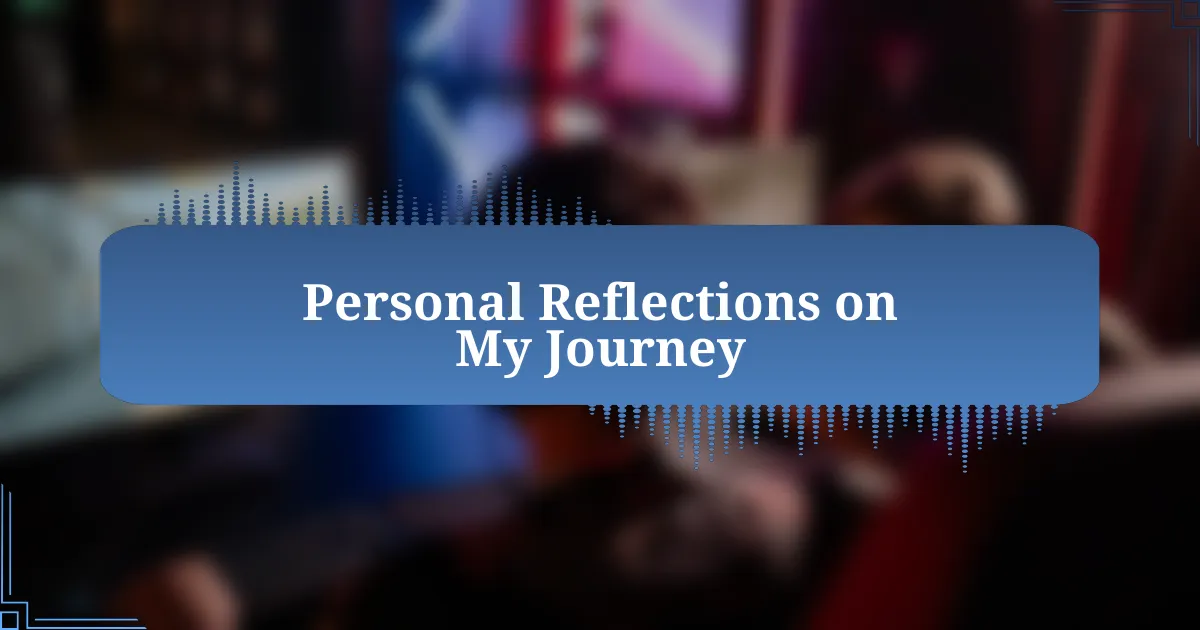
Personal Reflections on My Journey
Reflecting on my journey through Counter-Strike 2, I often find myself thinking about my early days as a novice player. I remember the nervousness I felt during my initial matches; every shot and decision felt weighty. It was exhilarating yet overwhelming, as I navigated the chaos of gunfire and strategic placements. Have you ever felt that blend of excitement and fear when stepping into a new environment?
One memory that stands out is the first time I achieved a clutch play. My heart raced, and I could hear my own breath as I picked off my last two opponents. In that moment, I was flooded with a sense of accomplishment that I hadn’t anticipated. It felt like the culmination of countless hours of practice and learning from my teammates’ insights. Can you recall a moment when you surprised yourself with what you could achieve in the game?
As I progressed, I learned to embrace my failures. Each defeat was a lesson in disguise, making me resilient and more strategic in my approach. I became more reflective, often asking myself what I could have done differently. How has your own experience shaped your understanding of success and failure in the game? This journey has taught me that growth is often uncomfortable but ultimately rewarding.











